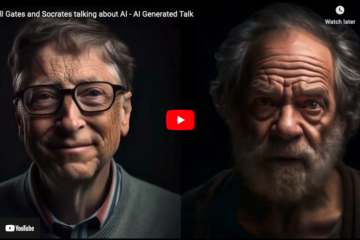
In curriculum discussions surrounding current trends in marketing education, I am often asked about the impact of artificial intelligence on the future of education. There is no doubt that academics, especially marketing academics, are scrambling to keep up with the exponential growth in technology and innovation in both theory and practice. The question that looms for professors, what value will we provide when all knowledge is just a thought away? Let’s dive deeper.
We have been hearing about the impact of AI for a decade now, with tech giants like Elon Musk, Ray Kurzweil, and Peter Diamandis leading the charge. Many different perspectives exist about this macro-topic, but most coalesce around the idea of promise verses peril. On one hand, popular movies like The Matrix, Terminator, and Transcendence have heavily depicted peril and the potential end of the human race as machines seek to dominate. This films at worst depict the eradication of the human species and at best show machines becoming ambivalent to the needs of a sub-species of humans. Furthermore, recent streaming shows such as Altered Carbon, The Feed, and Westworld continue this theme of artificial intelligence causing major disruptions and harm to humans. These depictions, while categorized as “science fiction” are only capitulated by tech moguls, like Elon Musk, admitting that he believes there is only a “1-in-billion” chance that we are NOT currently living in a simulation. Arguably, the Albert Eistein of our generation, and Elon is not afraid to discuss his fears of a superintelligent AI that will far surpass the processing speed of humans in the very near future.
On the other hand, you have the creators of the Singularity University, Ray Kurzweil and Peter Diamandis, that take a transhumanist approach and argue that the rise of AI is promise for the human species. In Ted Talks by Ray Kurzweil, head of product development at Google, Ray contends that the speed of artificial intelligence will surpass the process speed of human brains by the end of 2029. Furthermore, he believes the only way for humans to continue to evolve beyond the limiting size of their physical craniums is for them to adopt technology into their bodies that will directly connect them to the cloud, to become a cyborg if you will. Kurzweil contends we are already cyborgs, just currently using our phones as the digital interface that connects us to the cloud; but in less than a decade, the technology will exist to connect our brains directly to the cloud. This new digital interface is tech companies current “space race.” Even Elon Musk is working on this interface through one of his companies called Neuralink.
Understanding this larger macro conversation can often set the conversation of value regarding digital marketing education amidst this exponential growth in technology. Are you promise vs. peril? Are you for the convenience and connectivity of artificial intelligence in a simulated world and its new modalities of teaching in the metaverse someday? Or do you fear the coming machine apocalypse and should resist at all costs, holding onto the value of the personal and tactile approach of face-to-face learning? At the most minimal level of this discussion, evidence of this dilemma is being argued across academia as graduate programs are primarily being taught online now (Forbes.com).
While there is no doubt that technology is growing at exponential speeds, not at all in a linear fashion, some believe that Kurzweil’s predictions will take much longer than he expects to be fully integrated into our human culture. Either way, when our species does eventually accept neuro-linked connections to the cloud, all education will inevitably have to adapt to the new technological and transhuman capabilities. Whether in our lifetimes or not, there is evolutionary change coming, bar some major catastrophe that alters our current technological trajectory. But until we are connected to the cloud 24-7, our current education system will continue to test and develop various pedagogies and modalities to fit the current needs of the customer.
Currently, digital marketing education is made up of theory and practice. As a previous JME article in 2019 has demonstrated, as a marketing educator, our field has been completely disrupted by the introduction of the Internet. Moving from Web 1.0 in the mid-1990s to the introduction of Web 2.0 with reciprocal feedback loops between company and consumer to now the introduction of Web 3.0 with machine learning, automated bots, and the feedback loop between consumer and now software, our world has become filled with automated ads and digitized services. Marketing professors are tasked with staying relevant in the classroom as both theory and practice outpace their practical digital skill sets. Many universities are hiring clinical professors because business schools have yet to adopt paid externships for their faculty to acquire these new skills. In fact, many professors who have been in academia for more than 5-10 years have expressed feeling like aging dinosaur in a rapidly moving world of business. Furthermore, students have noticed it as well. Anecdotal stories of professor ratings are increasing about content being out of date before the textbook has even been published, which has actually led to a decrease in the use of textbooks altogether in our field.
To hold value, professors are now creating their own content. How many professors in digital marketing have switched to creating their own course, their own curriculum, their own examples backed by guest speakers that practice the needed skills daily to reinvorce concepts and methods? Qualitative research across universities is demonstrating that while Covid provided a short period of holding down the fort, now that we are moving beyond lockdown, many universities are initializing program overhauls or introducing new plans. For example, on June 22, 2022, Florida State University announced a $10M donation to start a “School of Marketing.” Earlier this year, Babson University, in partnership with The Arthur M. Blank Family Foundation, announced a $50M grant to establish their School for Entrepreneurial Leadership. And just recently, Morehouse College became the first university to launch classes in the metaverse.
These trends suggest that academia will not go down without a fight, trying its very best to stay relevant in this current exponential growth of technology. It is a complex dilemma for universities. We would love to hear your comments about this change. What will keep us relevant in the coming decades? What value will we hold and to what target markets? Let us at The Digital Engine know your thoughts in the comments box below.




0 Comments